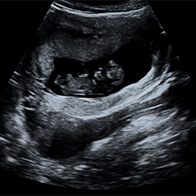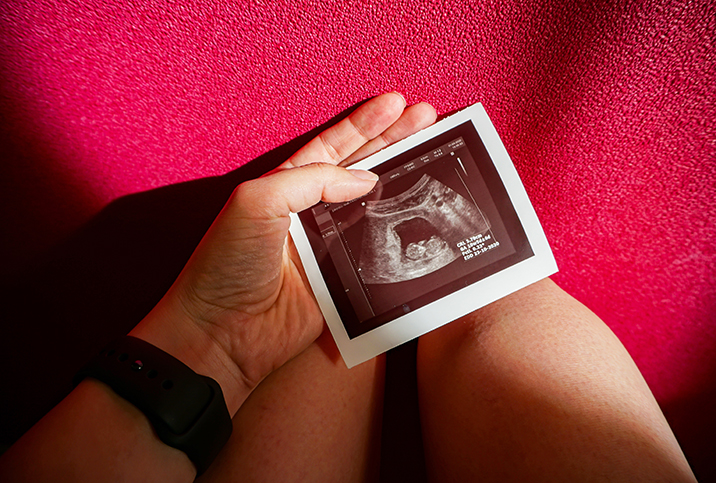The Hidden Grief of Early Pregnancy Loss

Early pregnancy loss—before 13 weeks—occurs in at least 10 out of 100 known pregnancies. While the experience may feel singular, you aren't alone in your grief, and there are ways to heal.
"It's an invisible grief or what [is] referred to as disenfranchised grief," said Mary Gillis, M.A., R.C.C., a perinatal counselor at Lotus Counselling in Vancouver, British Columbia, who often sees patients experiencing grief stemming from early pregnancy loss. "It's not generally acknowledged by other people or our culture. And so there's an expectation for a lot of people [who] have just experienced a miscarriage or pregnancy loss to move on, get back to their life and act as if nothing's happened and just be positive."
Why pregnancy loss happens
Prenatal and postnatal concerns in women are often considered too "difficult" to talk about because our society has built an idealized version of pregnancy and motherhood. Any deviation from this ideal may be considered unacceptable or uncomfortable, which can make it hard for women to reach out and seek help.
Early pregnancy loss is not preventable, said Astrid Christoffersen-Deb, M.D.C.M., a gynecologist in the department for early pregnancy detection and miscarriages at BC Women's Hospital & Health Centre in Vancouver.
She explained the primary cause of early pregnancy loss is aneuploidy, a condition in which the embryo has missing or extra chromosomes.
"The majority of losses we see clearly are able to establish some form of pregnancy," Christoffersen-Deb said. "But as the development ensues and the chromosomal makeup is not correct, then we...start to see pregnancy losses that then occur."
The number of documented pregnancy losses has increased due to advancements in detection.
"Nowadays, because your pregnancy test can detect pregnancy so early, we are seeing more and more losses, because we've never been so good at detecting the early pregnancy," Christoffersen-Deb said.
"One in 4 women or 1 in 4 couples will experience a miscarriage during this [early pregnancy] time period," she said.
The risk increases with a woman's age. This is largely because women are born with all the eggs they will ever have. As the woman gets older, so do her eggs, and the older the egg, the more likely it is there will be errors at the time of fertilization.
The structure of the uterus can also impact the viability of a pregnancy.
"The uterus may be abnormally shaped or have lesions or infections in it that make it more likely for you to have a pregnancy loss. But that's a much, much smaller group," Christoffersen-Deb said.
Women who have medical concerns, such as diabetes, thyroid conditions or other autoimmune conditions, may also suffer early pregnancy loss.
The grieving process
Twenty-five percent of Christoffersen-Deb's patients are women experiencing miscarriages. This underscores the importance of aftercare and the availability of therapy and other resources for women experiencing grief.
The grief stemming from a pregnancy loss is very complex, said Beverley Anderson, M.S.W., R.S.W., a therapist who specializes in perinatal mental health at Mariposa Psychotherapy Services in Vancouver.
"Oftentimes, my clients maybe haven't even let someone know that they were pregnant," Anderson said. "So they haven't shared the joy that they were pregnant, and then they also...don't necessarily share the devastation and the pain that they've lost their child. There's also a lot of shock, hopelessness, despair, self-blame, you know, 'What did I do wrong? Was there something I could have done? Is this my fault?' And just a deep, profound sadness."
As therapists, both Gillis and Anderson encourage their clients to take time with this grief and not rush the process.
Anderson said she believes in creating a space for whatever emotions arise and encouraging her patients not to rush into finding meaning or rationalizing. Grief therapy is about holding emotional space for clients to feel all the big feelings that come up and staying with them for as long as the client needs.
Grief, and the process associated with it, is very individual, so Gillis said her go-to method is to refer clients to resources they can engage with outside of therapy sessions. She gets to know their strengths and coping history—the tools or coping mechanisms they used in the past to get through difficult times—and encourages them to use some of those tools as part of their healing process.
Gillis also said mindfulness—the ability to watch where thoughts go and accept that those thoughts may not be helpful at that moment—can serve as an important tool.
The woman's partner and loved ones should not invalidate the grief with statements such as "You can try again" or "It was early."
"As partners and family friends, it's important for them to understand and be curious about what it meant to that person and support them and not be afraid of the grief process. Again, you cannot bypass it. As they say, the only way out is through," Gillis explained.
This grief is also multilayered. Intimacy, and even the idea of trying for a baby again, can be scary. Neither doctors nor therapists provide patients with a timeline to resolve these thoughts, because it is a very individual process.
Grief is complicated
Grief is not a linear process; even less so when it is socially invalidated.
For women who have faced a pregnancy loss or recurring losses, it's important to remember to take care of yourself through the grieving process, as hard as it may be. This self-care can be as simple as pampering yourself, meditating, or getting back into an old hobby or taking up a new one.
Loss leaves an indelible mark, and for some people, creating a ritual or a symbol that honors the loss in a tangible way, such as planting a tree, getting a tattoo or performing a ceremony, can be healing.
It's impossible to place a timeline on grief. It evolves over a lifetime, and the colors and contours of it also change with time, Anderson said.




















